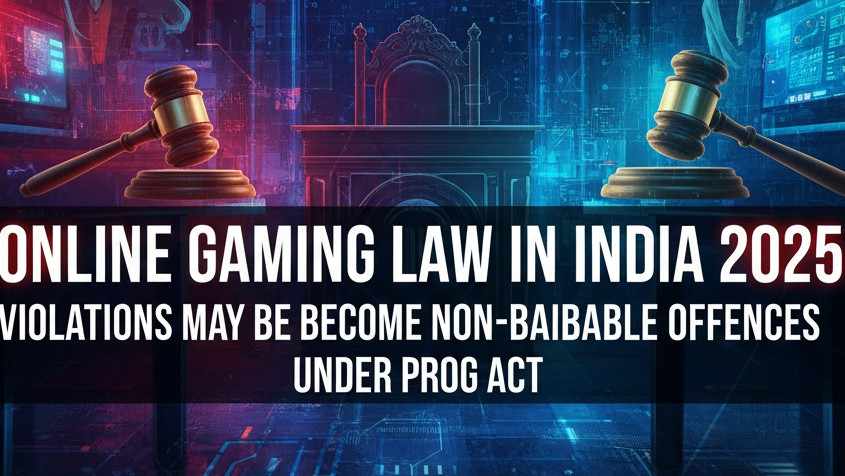The Government of India has proposed draft rules under the Promotion and Regulation of Online Gaming (PROG) Act, 2025. Violations in online money games could soon be treated as cognizable and non-bailable offences. Learn what this means for players, companies, and India’s digital economy
Online Gaming Law in India 2025: Violations May Become Non-Bailable Offences
The Government of India has taken a significant step toward regulating the fast-growing online gaming sector. Under the Promotion and Regulation of Online Gaming (PROG) Act, 2025, the draft rules propose to make violations in online money games cognizable and non-bailable offences.
This move highlights the government’s intent to ensure player protection, financial transparency, and responsible gaming practices while curbing illegal activities linked to online betting and gambling.
What Does the PROG Act, 2025 Mean?
The Promotion and Regulation of Online Gaming Act, 2025, is designed to create a uniform legal framework for the online gaming industry in India. The Act covers areas such as:
- Licensing and regulation of online gaming platforms.
- Mandatory disclosures on money-based games.
- Age restrictions to prevent underage participation.
- Consumer protection measures for safe play.
- Data security and grievance redressal mechanisms.
Most importantly, the proposed amendment would make rule violations in online money games punishable under criminal law, meaning offenders could face immediate arrest without bail at the initial stage.
Cognizable and Non-Bailable: Why Is It Important?
- Cognizable Offence: Police can register a case and investigate without prior approval of a magistrate.
- Non-Bailable Offence: Accused individuals cannot demand bail as a right; bail is granted only at the court’s discretion.
By categorizing online gaming violations this way, the government sends a strong message about its seriousness in tackling fraud, money laundering, and gambling addictions tied to online games.
Why Is the Government Taking This Step?
The online gaming industry in India is booming, expected to surpass $8 billion by 2027. However, it also brings risks such as:
- Addiction among youth is leading to mental health and financial issues.
- Illegal betting networks are using online platforms.
- Fraudulent practices like rigged games or hidden charges.
- Money laundering and tax evasion through unregulated apps.
By tightening the law, the government hopes to ensure the legitimate growth of gaming companies while safeguarding users from exploitation.
Impact on Players and Companies
- For Players:
- Safer platforms with stricter rules.
- Better grievance redressal in case of fraud.
- Potential restrictions on certain high-risk money games.
- For Companies:
- Compliance with licensing and tax norms becomes mandatory.
- Heavy penalties for rule violations.
- Foreign gaming companies must align with Indian laws to operate.
Industry Reactions
While many consumer groups and parents have welcomed the move, some industry associations argue that overly strict regulations could discourage investment and innovation. They suggest that instead of criminalizing violations, the government should adopt progressive taxation and compliance models.
What Happens Next?
The draft rules are currently open for public consultation. Stakeholders—including gaming companies, legal experts, and player associations—can submit feedback before the final notification. Once implemented, these rules could reshape the online gaming ecosystem in India.
FAQs on Online Gaming Law in India 2025
What is the PROG Act, 2025?
The Promotion and Regulation of Online Gaming Act, 2025, is a proposed law to regulate online money-based games in India through licensing, transparency, and consumer protection measures.
What does “cognizable and non-bailable” mean for online gaming offences?
It means police can arrest without prior court approval, and bail is not guaranteed, making violations more serious than civil or bailable offences.
Will all online games be affected?
No, the rules mainly target money-based games involving stakes or wagers. Free-to-play games without real money elements are not under strict scrutiny.
Conclusion
The online gaming law in India 2025 could mark a turning point in how the country balances innovation with regulation. By making violations cognizable and non-bailable, the government aims to crack down on illegal betting and safeguard players. However, the industry will need clarity and supportive policies to continue growing responsibly.

























